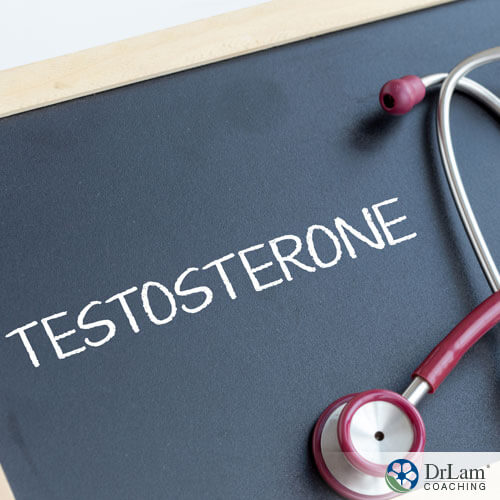 The idea that women need testosterone for their best health has been neglected until very recently. When women go through menopause or experience hormone imbalances, the focus is often on their estrogen levels. But recent insights into the importance of testosterone in women is changing that. This hormone is just as essential in the female body as it is in the male body. And when the levels change because of menopause or other health threats, it can be devastating to your health and quality of life. This is a vital insight if you have Adrenal Fatigue Syndrome (AFS), as it is often associated with hormonal imbalances and other medical issues.
The idea that women need testosterone for their best health has been neglected until very recently. When women go through menopause or experience hormone imbalances, the focus is often on their estrogen levels. But recent insights into the importance of testosterone in women is changing that. This hormone is just as essential in the female body as it is in the male body. And when the levels change because of menopause or other health threats, it can be devastating to your health and quality of life. This is a vital insight if you have Adrenal Fatigue Syndrome (AFS), as it is often associated with hormonal imbalances and other medical issues.
Testosterone is a male sex hormone that’s not usually thought of in connection with women. However, it’s also a key hormone in women’s health and development. Testosterone is mostly produced by the ovaries and the adrenal glands. It plays key roles in the growth of female reproductive organs, bone mass, and their physical appearance. The natural levels of testosterone in women are lower than they are in men, between 15 and 70 nanograms per deciliter (ng/dl). The normal testosterone levels for men are between 280 to 1,100 ng/dl. However, this doesn’t mean that low levels of testosterone in women should just be ignored. Recent research into menopause and hormone imbalances in women shows the importance of this hormone for every aspect of the female body, behavior, brain, mood, and function.
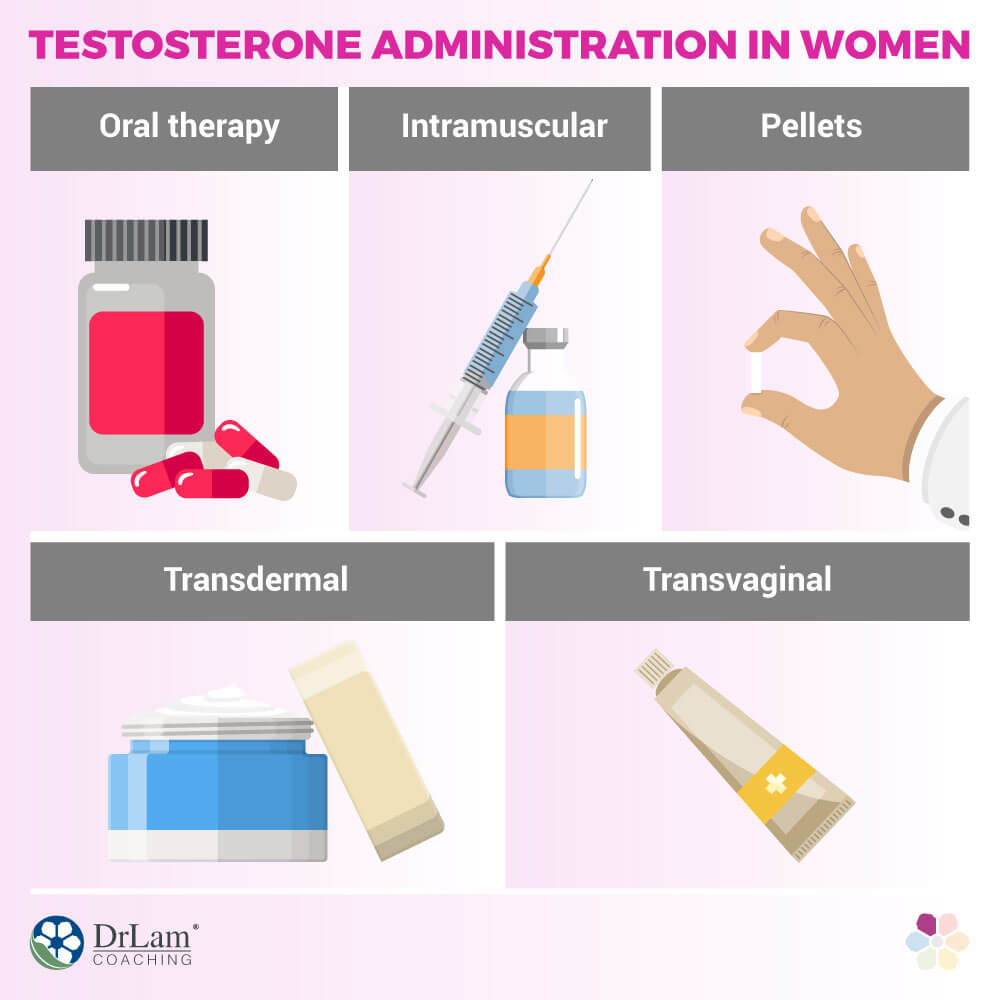
Testosterone therapy (or androgen therapy) can be given in a number of ways. This includes:
The most important thing about improving the low levels of testosterone in women is that you find the solution that works best for you. Consult with your medical practitioner and adjust your treatments until you get the desired results with a therapy option that suits your lifestyle.
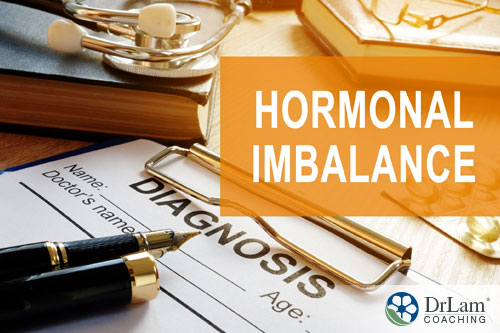 Much of the research on testosterone in women focuses on alleviating problems and symptoms associated with getting older and hormone imbalances. Some of the problems suffered by women who are lacking in testosterone are:
Much of the research on testosterone in women focuses on alleviating problems and symptoms associated with getting older and hormone imbalances. Some of the problems suffered by women who are lacking in testosterone are:
It can be difficult to determine if these problems are due to testosterone deficiencies, or many disorders that are associated with aging. However, some clear signs that testosterone therapy may be needed are:
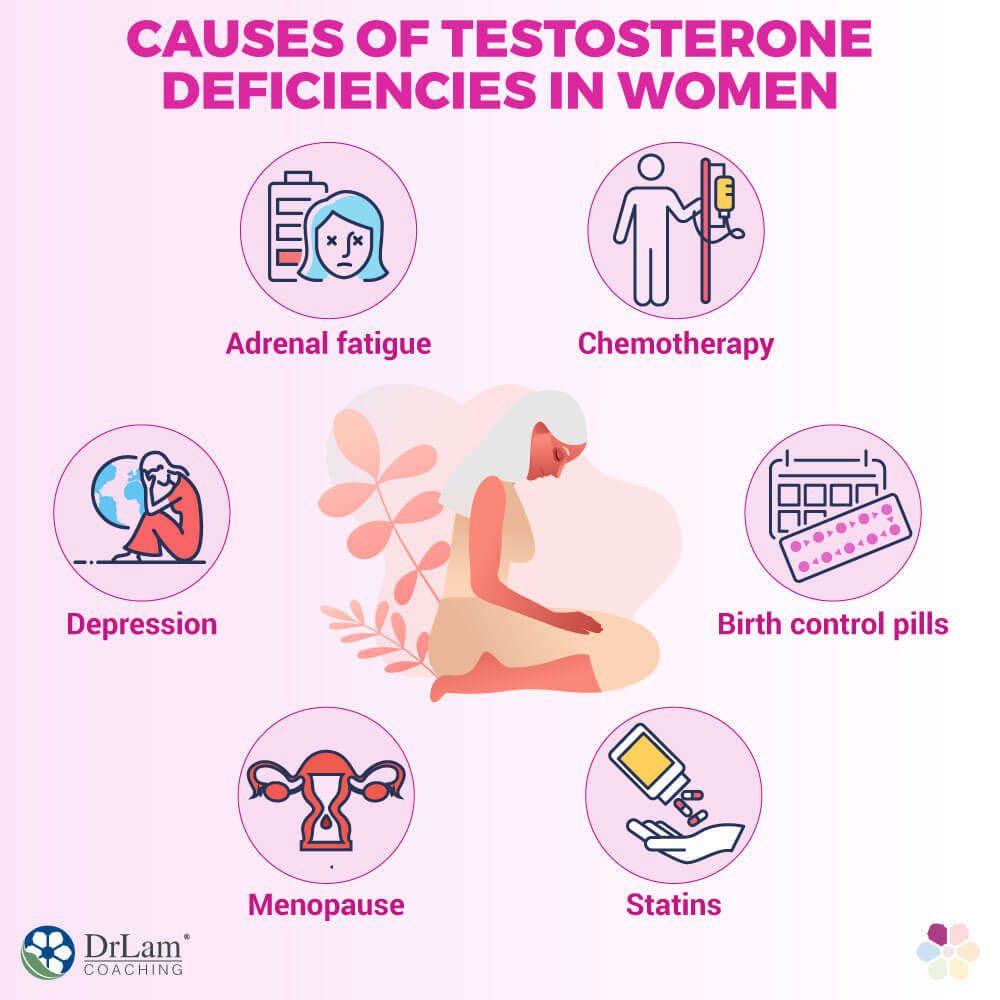
There is a range of health issues and threats that can cause low levels of testosterone in women. So, if you’ve experienced any of these issues, it’s worth getting your testosterone levels checked. You’ll be able to detect any problems that may arise from testosterone deficiency. Some of the causes of low testosterone levels in women are:
AFS is one issue that can bring on, or exacerbate low levels of testosterone in women. This is a serious problem that isn’t well understood or addressed in the medical field.
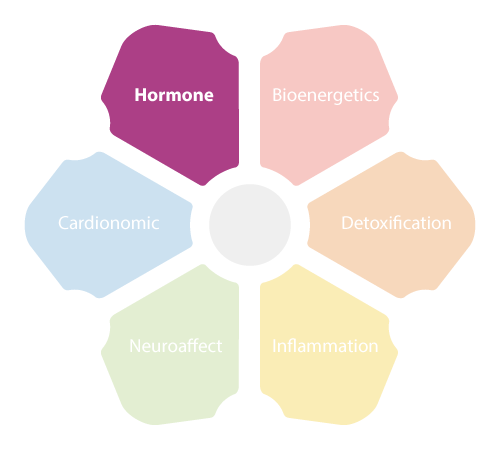 In women, the Hormone Circuit consists of the adrenals, the thyroid, and the ovaries. Unfortunately, when you have AFS, this is often one of the first circuits to become affected. During the early stages of AFS, the adrenal glands become fatigued because of the increasing demand for cortisol. This is part of the NeuroEndoMetabolic (NEM) stress response, the body’s defense against stress and its ability to react to stress. When you’re under stress, the adrenal glands secrete cortisol to prepare your body to fight or flee. This only becomes a problem when you’re under stress over a long period. Your hormones will become imbalanced as your ovaries react to high cortisol levels. This can cause a variety of problems with your menstrual cycle, weight, energy levels, and even with your fertility.
In women, the Hormone Circuit consists of the adrenals, the thyroid, and the ovaries. Unfortunately, when you have AFS, this is often one of the first circuits to become affected. During the early stages of AFS, the adrenal glands become fatigued because of the increasing demand for cortisol. This is part of the NeuroEndoMetabolic (NEM) stress response, the body’s defense against stress and its ability to react to stress. When you’re under stress, the adrenal glands secrete cortisol to prepare your body to fight or flee. This only becomes a problem when you’re under stress over a long period. Your hormones will become imbalanced as your ovaries react to high cortisol levels. This can cause a variety of problems with your menstrual cycle, weight, energy levels, and even with your fertility.
Hormone Circuit imbalance often occurs early on in AFS. When under stress, your hormones will naturally change in response. Fertility isn’t important when your life is under threat. This is why the slowdown of these functions is one of the most important changes that cortisol makes during times of stress. However, this goes a step further when you have AFS.
When the adrenals become fatigued, it sets off a chain of reactions throughout the body. It also affects the other two organs in the Hormone Circuit. Imbalance in this circuit can be incapacitating when they become severe. So ideally, these types of problems need to be detected early. Every case and every situation are different. Some women usually experience a unique combination of issues when this circuit becomes unbalanced. Symptoms of imbalance include dry skin, cold sensitivity, decreased metabolism, irregular menstrual cycles, mental health distress, fatigue, aches and pains, diabetes, sugar intolerance, and weight control issues.
The ovaries produce both estrogen and testosterone, hormones that are essential for good health and for a variety of the body’s functions. Imbalances or deficiencies in these hormones are due to the withdrawal of the ovarian functions. This a cause for low levels of testosterone in women that is not well understood. It’s also one that needs to be addressed if you’re trying to improve your health and alleviate the problems associated with AFS.
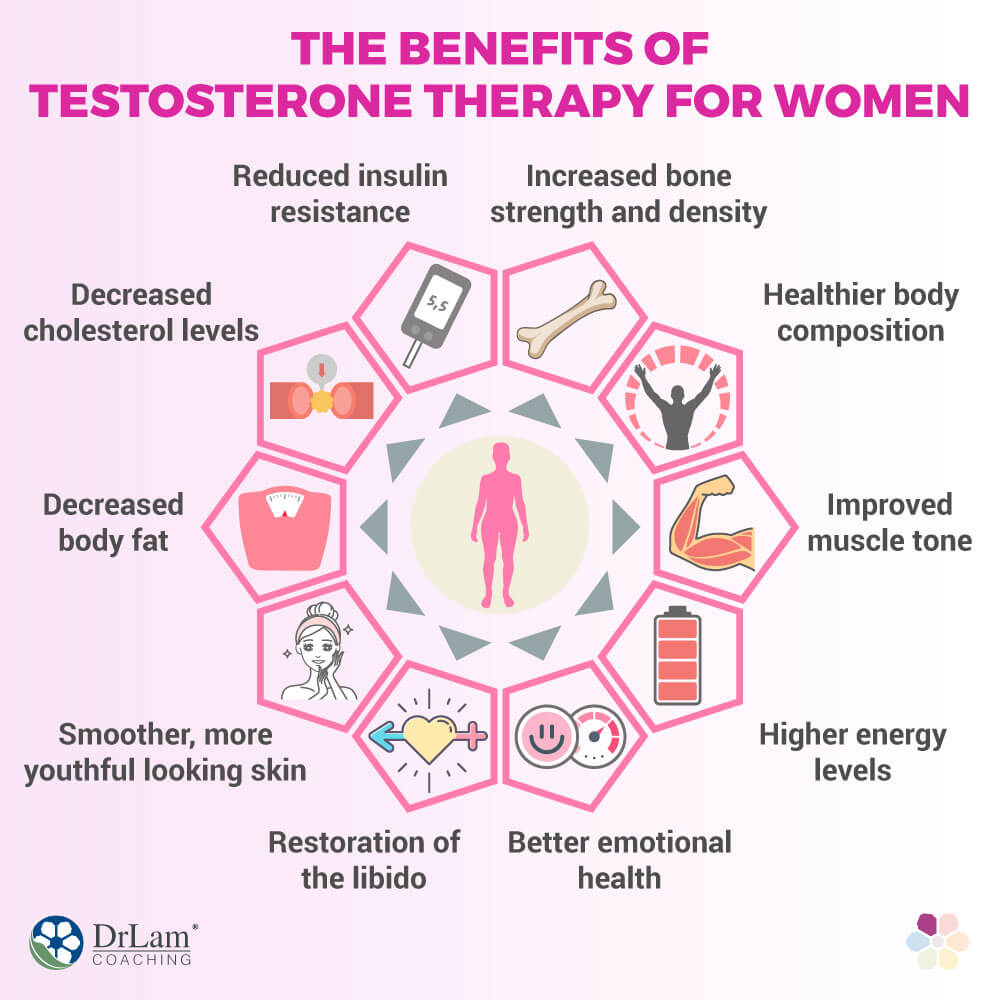
Women need stable levels of testosterone in their bodies for a variety of reasons. Some of the benefits of testosterone therapy for women are:
By restoring more natural levels of testosterone in women, these issues can be alleviated. This will markedly improve your health and quality of life.
 Obesity, excess weight, and body fat composition are serious problems for women as they age. Many women experience a loss of muscle, abdominal weight gain, and a lot of weight fluctuations. This will make you prone to more health problems that are associated with excessive weight gain. There are a variety of reasons for these changes, including dietary and lifestyle changes. However, it can also be due to testosterone deficiency. Studies have shown that hormones have a fundamental role in determining metabolism and body composition. So, by replacing declining hormone levels, you will notice a strong positive effect on your body mass index (BMI). Such hormone therapy will also affect your physical strength, as it encourages the rebuilding of healthy muscles.
Obesity, excess weight, and body fat composition are serious problems for women as they age. Many women experience a loss of muscle, abdominal weight gain, and a lot of weight fluctuations. This will make you prone to more health problems that are associated with excessive weight gain. There are a variety of reasons for these changes, including dietary and lifestyle changes. However, it can also be due to testosterone deficiency. Studies have shown that hormones have a fundamental role in determining metabolism and body composition. So, by replacing declining hormone levels, you will notice a strong positive effect on your body mass index (BMI). Such hormone therapy will also affect your physical strength, as it encourages the rebuilding of healthy muscles.
Another issue linked to excess weight and obesity is insulin resistance and metabolic syndrome. Metabolic syndrome is a disorder that causes clusters of conditions that are associated with Type II diabetes and cardiovascular disease. However, adequate levels of testosterone may help to reverse these issues. Adequate levels of testosterone in women can help improve insulin sensitivity and improve blood sugar levels.
Women with AFS often experience weight gain or changes in weight distribution in their bodies. This is due to a number of factors including fatigue, which often causes overeating or a reliance on sugar to give energy. There are also hormonal changes associated with an imbalance in the Hormone Circuit. This is a problem that can cause a lot of stress for women and it can adversely affect your self-esteem. This creates a vicious cycle of weight gain brought about by ill health, stress, and distress because of the weight gain. This only worsens your health and increases your stress levels. And this, in turn, will worsen your AFS.
Taking measures like dieting or trying to increase your exercise levels, may worsen your AFS symptoms. This may leave you more exhausted without changing your weight issues. However, if you have AFS, then it’s likely that low testosterone levels are at least partially responsible for the weight gain. According to the research into testosterone in women, addressing this problem will have the added effect of assisting with weight loss and improving muscle mass. Hormone therapy may also help to address insulin resistance, lower your stress levels and improve your health. These are all essential steps on the road to AFS recovery.
According to recent research about the benefits of correcting low levels of testosterone in women, adequate testosterone levels may also help to improve your heart health. Here are some of the benefits you may notice when you try testosterone therapy:
A high cholesterol level is an issue that’s strongly linked to heart disease, heart attack, and early death. Some studies have found that testosterone lowers the low density lipoprotein (LDL) cholesterol levels, as well as total cholesterol levels in the body. This research is still in the early stages, so more research is needed to determine the overall effect of testosterone on cholesterol in the body. However, if you’re experiencing these types of problems, then testosterone therapy could help.
Atherosclerosis is a condition where plaque accumulates on the walls of the arteries. Eventually, this plaque hardens to the point where it blocks your blood flow. This is particularly dangerous when it occurs near the heart or brain, and it’s linked to heart attacks and strokes. Addressing low levels of testosterone in women can help to alleviate this issue.
CAD is the most common type of heart disease and occurs when the arteries leading to the heart become hard and narrow because of atherosclerosis. Recent studies are showing that low serum testosterone levels in postmenopausal women are linked to an increased risk of CAD. This link is independent of other metabolic risk factors. So, if you’re looking for ways to decrease your risk of this fatal disease, then testosterone therapy may be the answer.
This information on the benefits of improving low levels of testosterone in women for your heart health is also important for your total health and AFS recovery. Any issues with your heart health (or total health) will increase your stress levels. Health problems may also cause mental and emotional distress, which will increase your body’s cortisol demand, further overworking the adrenals. By addressing your heart and overall health, you will be taking a step towards recovery from AFS.
 Improving low testosterone in women also may improve your menstrual cycle. Taking testosterone may help reduce premenstrual syndrome (PMS) symptoms and help improve menorrhagia. Menorrhagia causes heavy menstrual bleeding or prolonged bleeding. It is usually caused by hormonal imbalances, ovarian dysfunctions, certain medications, fibroid, polyps, or cancer. Studies have shown that testosterone can help reduce heavy bleeding during menstruation and also bleeding in premenopausal women.
Improving low testosterone in women also may improve your menstrual cycle. Taking testosterone may help reduce premenstrual syndrome (PMS) symptoms and help improve menorrhagia. Menorrhagia causes heavy menstrual bleeding or prolonged bleeding. It is usually caused by hormonal imbalances, ovarian dysfunctions, certain medications, fibroid, polyps, or cancer. Studies have shown that testosterone can help reduce heavy bleeding during menstruation and also bleeding in premenopausal women.
Common problems amongst women with AFS are PMS, infrequent menstrual cycles, and menorrhagia. This is usually the result of an imbalance in the Hormone Circuit, which can cause hormone deficiencies, estrogen dominance, or ovarian dysregulation. For women, this can be very distressing and embarrassing. Heavy menstrual flow can make daily activities difficult. Common symptoms of PMS such as fatigue, pain, and bloating can also seriously impact your wellbeing. When these symptoms become worse due to AFS, your quality of life is adversely affected.
It’s important that you don’t ignore these issues and that you freely speak with your medical practitioner about them. There are a lot of therapies that can help address these issues, including hormone therapy.
Some women may experience sexual health issues either as a result of AFS or because of menopause. Problems in this area are not only distressing, but they can also affect your personal relationship with your partner. Some of the problems that women may experience in this area are:
For a long time, testosterone wasn’t recommended for women who experienced these kinds of problems. Instead, other hormones were blamed for these problems and were also seen as the solution. But this is rapidly changing. Today, low levels of testosterone in women are proving to be heavily linked to sexual dysfunction and related issues.
Women with AFS often experience sexual dysfunction due to lack of energy, hormone imbalance, and higher stress levels. This increases their stress levels, often damages their relationships, and leaves them feeling depressed, anxious and disconnected with their partners. So, if you’re experiencing any of these issues, then speak with your medical professional about testosterone therapy.
Improving low levels of testosterone in women may also help with estrogen deficiencies. Estrogen deficiencies are common once women go through menopause and their ovaries stop producing this essential hormone. This can have a variety of effects such as painful sex, hot flashes, breast tenderness, depression, headaches, mood swings, irregular periods, and an increased incidence of urinary tract infections. Low estrogen levels are also strongly linked with problems like osteoporosis, low energy levels, and hypothyroidism.
Your body can break down excess testosterone to make estrogen, so any deficiencies in this hormone will benefit from testosterone therapy. However, there is a problem with this as well. Estrogen dominance is very common among menopausal women. This is due to low levels of another hormone known as progesterone. When ovulation ceases, only a very small amount of progesterone is present in the body. The remaining progesterone is made by the adrenal glands, whereas the body still continues to produce estrogen at around half the pre-menopausal rate. Progesterone acts as a counter to estrogen, balancing out its effects and ensuring there are no negative consequences. As a result, many women experience estrogen dominance once they go through menopause.
This estrogen dominance may cause problems such as increased body fat, and increased risk of blood clots, breast cancer, and endometrial cancer. We advise that you consult with your medical practitioner who’s aware of the potential problems that can occur with testosterone therapy. They will be able to help you determine if you have estrogen dominance and the best ways to address low testosterone levels without making this problem worse. As with most issues associated with AFS, balancing the Hormone Circuit in this way can be a delicate and highly individualized process. That’s why you need the help of a professional who understands the effects of AFS and how to rebalance your hormones without making your condition worse.
Some of the more unexpected benefits of increasing the levels of testosterone in women are how it affects brain health:
Studies have shown that testosterone can inhibit the production of inflammatory cytokines, which will lower inflammation in the body. Inflammation is critical in AFS because it contributes to the toxic accumulation throughout the body and also causes damage to the gut, brain, and other organs. Inflammation is an essential process in the body. When toxins or pathogens enter your body, they must be flushed out to help you return to good health.
However, chronic inflammation has detrimental side effects. Chronic inflammation in the brain affects neurotransmitter levels and the production and release of essential hormones. It’s also linked to diseases such as Parkinson’s, Alzheimer’s, epilepsy, and depression. So, by reducing cytokines, testosterone can help to alleviate inflammation levels, which will benefit your overall health and reduce your AFS.
If you have AFS, then you probably experience brain fog, memory problems, and reduced cognitive function. However, studies on the effects of testosterone in women show that testosterone can help to improve this situation. If you have AFS, this will help clear away some of the most common symptoms of this disorder and improve your quality of life.
 If you experience pain as a result of injury, disease, or disorder, then testosterone therapy can help reduce your pain levels. This can also be very helpful when you have AFS and any painful symptoms.
If you experience pain as a result of injury, disease, or disorder, then testosterone therapy can help reduce your pain levels. This can also be very helpful when you have AFS and any painful symptoms.
Testosterone therapy can improve mood, depression, and anxiety. Women who have unbalanced hormones because of AFS or other disorders, often experience mood swings. A very common way to address this issue is with harsh medications that may cause adverse reactions. Instead, you need to address the underlying causes of mood disorders, not just the symptoms. This is important for the success of AFS recovery. Rebalancing the Hormone Circuit with testosterone therapy is a more effective way to improve and stabilize your mood and quality of life.
Testosterone may cause masculine characteristics like a deep voice and hair growth or loss. However, these side effects are dependent on the testosterone dosage. Women do not receive the same dosage as men with a testosterone deficiency.
Another issue that’s often raised in connection with testosterone in women is breast cancer. However, this information is both outdated and highly exaggerated. In fact, recent studies suggest that androgen therapy may actually help protect breast tissue against cancer. Presently, there isn’t enough information to evaluate the risk of breast cancer when you have testosterone therapy. However, the fact that the female body naturally produces testosterone, and suffers when its levels decline, highlights the importance of this hormone. So, be aware of the potential risks of testosterone therapy, but don’t let them scare you away from all the benefits. That’s why it’s important that you consult with a medical professional who knows about the importance of testosterone in women and can give you a healthy and natural dosage of this hormone.
You can also increase your testosterone levels with supplements. These are a little less effective than testosterone therapy, but they can still be helpful. Here are some of the supplements that can boost testosterone levels:
Certain lifestyle changes will also help to boost low levels of testosterone in women. These include:
Be careful when adopting these strategies when you have AFS. These methods may cause negative reactions. Make sure that you get the assistance of a medical professional who can guide you safely through the process.
When you have AFS, you need to look at your body holistically. You need to look at the underlying causes and find ways to correct the problems. This usually requires a rebalancing of your Hormone Circuit. However, this can’t be done with a blinkered focus on estrogen and the effects of deficiencies of this hormone. Instead, you need to consider all the hormones and their role in your best health. This means finding a medical practitioner who’s aware of the importance of testosterone in women and can help you address its declining levels and any accompanying issues.
© Copyright 2020 Michael Lam, M.D. All Rights Reserved.
For a long time, testosterone was only thought of in connection with men. But these days, more studies are coming out about the importance of testosterone in women. If you struggle with fluctuating hormone levels, then this is another one that you need to consider.
